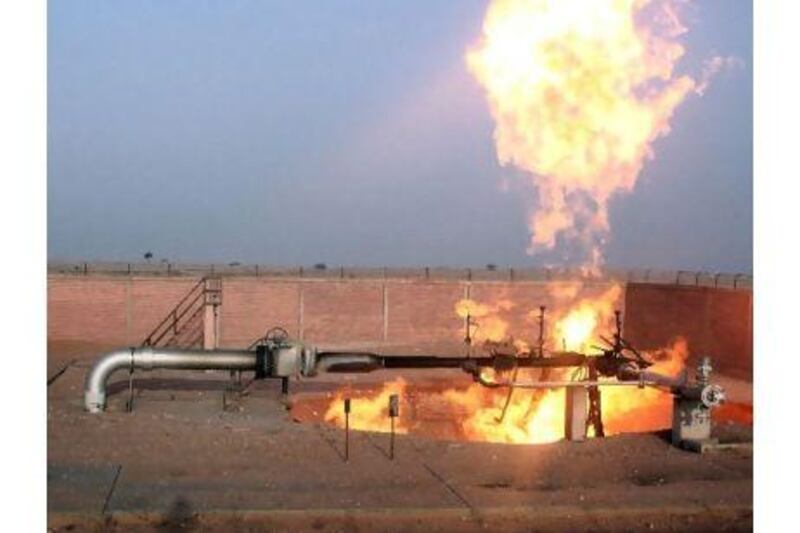CAIRO // Egyptian exports of natural gas to Israel and Jordan have been cut for the second time in three months following a massive pipeline explosion yesterday in the northern Sinai.
The explosion — blamed on unidentified saboteurs — demonstrated the continued lack of security around the pipeline following a February 5 attack that disabled it for a month. The renewed curtailment of gas will push up the cost of energy production in Israel and Jordan as summer approaches and spur efforts to achieve energy self-sufficiency in both countries, analysts say.
Egyptian officials halted the flow of gas shortly after the blast occurred at about 3am at a gas distribution centre near the town of El Areesh, MENA, the state news agency reported, citing GASCO, the company that owns and operates the gas line. There were no reported casualties.
Abdel Wahab Mabrouk, the governor of North Sinai, told state-run Nile TV that the explosion was "an act of sabotage".
The February 5 bombing of a different section of the pipeline, also near El Areesh, resulted in a 38-day suspension in the flow of gas to Israel. On March 27, the Egyptian military prevented a second attempted bombing of the pipeline, MENA reported.
Yesterday's explosion comes at a time of intense political and legal focus in Egypt on the gas export deal with Israel, which was signed in 2005 but re-negotiated last year. The deal's many critics have said it set too low a price for Egypt's gas and brought economic benefits to a country many Egyptians regard as an enemy state.
Last Friday, the prosecutor general announced he would detain Sameh Fahmy, the former Egyptian oil minister, and six other officials for 15 days to interrogate them on allegations that they wasted the state's resources by selling the gas at too low a price. Prosecutors on the same day extended the administrative detention of Hosni Mubarak, the former president, to give them time to question him about the same agreement. Mr Mubarak is now at a civilian hospital in Sharm el Sheikh.
On April 13, Egypt's prime minister, Essam Sharaf, announced that his government would review the terms and prices of gas export agreements with Israel and Jordan, following criticism from prominent political opposition figures who called for the deal with Israel to be cancelled.
Gas from Egypt covers 40 per cent of Israel's needs and 80 per cent of Jordan's. Gas exports are an important pillar of Egypt's economy, with 30 per cent exported by pipeline to Israel, Jordan and other Arab states and 70 per cent converted to liquified natural gas and shipped by tanker from a port near Alexandria.
Within Israel, the explosion yesterday immediately spurred calls for the government to find alternative sources of energy, including accelerated development of huge indigenous gas reserves that were discovered offshore last year and are expected to start flowing by the beginning of 2013.
The newly appraised reserves, including the Tamar and Leviathan fields, will likely produce enough gas to cover all of Israel's domestic needs and leave a margin for export, according to analyst forecasts.
The country's deputy foreign minister, Danny Ayalon, called for accelerated development of the fields in a statement yesterday.
"In light of regional instability, we must accelerate the production of Israeli natural gas in order to reach energy independence," Mr Ayalon said.
But the development of Tamar gas field is already proceeding on an "extremely tight timetable" and is unlikely to be completed before the target date, said Catherine Hunter, a Middle East energy expert at IHS Global Insight, an energy consultancy.
"Israel has got a problem at the moment, but it's a short-term problem given the likelihood of the development of Tamar," Ms Hunter said.
"Jordan's actually worse off than Israel because Israel can ramp up its own production, while Jordan can only turn to imported fuel oil" which is much more costly.
In February, the Jordanian officials said they were spending $28 million (Dh102.8m) a week to import fuel oil to replace the disrupted Egyptian gas. Jordan has barely any energy resources of its own and planned alternatives, such as nuclear power, could be at least a decade away from development.
The explosion also spurred calls within Israel for a move away from natural gas in general.
The Israeli government should boost the country's solar power programme by expediting approval of solar power plant licences and renewing a subsidy scheme for large plants as a substitute for gas, said Einat Wilf, a member of the Knesset, Israel's parliament.
"Israel must reduce its dependence on the resources of other countries, especially considering some of those countries are either hostile or unstable," Ms Wilf said in a statement yesterday.
cstanton@thenational.ae
Hugh Naylor contributed reporting from Jerusalem





